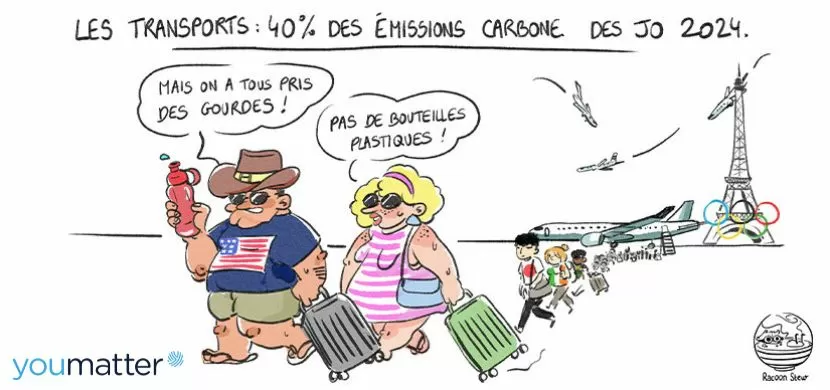Caricature. The essential of CO2 emissions from an event, whether it be sports or cultural, is linked to the transportation of visitors… In this context, can the 2024 Paris Olympics truly be « green »? To delve deeper: Environment: the 2024 Olympics can do better, our interview with Guillaume Kerlero de Rosbo (Eclaircies collective)
The eye of Racoon stew… on the 2024 Paris Olympics
As the world looks towards Paris for the 2024 Olympics, there is a growing concern about the environmental impact of such a large-scale event. With thousands of athletes, officials, and spectators traveling from all over the world, the transportation emissions alone could have a significant impact on the environment. But can the 2024 Paris Olympics truly be « green »? Let’s take a closer look.
According to a recent interview with Guillaume Kerlero de Rosbo, co-founder of the Eclaircies collective, the answer is not a simple yes or no. While the organizers of the 2024 Olympics have made efforts to reduce the event’s carbon footprint, there is still room for improvement.
One of the main concerns is the transportation of visitors to and from the event. With an estimated 10 million spectators expected to attend the Olympics, the emissions from flights, trains, and cars could be substantial. However, the organizers have announced plans to poursuit the use of public transportation and promote sustainable modes of travel, such as cycling and walking. They have also committed to offsetting the remaining emissions through carbon offset projects.
But it’s not just about transportation. The Eclaircies collective also highlights the impact of the construction of new venues and base for the Olympics. While these may be necessary for the event, they can also have a significant environmental impact, such as deforestation and air pollution. The collective suggests that the organizers could have chosen more sustainable options, such as using existing venues or implementing green building practices.
On a positive note, the 2024 Olympics have made a commitment to promoting sustainability and leaving a positive legacy for the city of Paris. This includes using renewable energy sources, promoting local and organic food, and implementing waste reduction and recycling programs. The organizers have also announced plans to create a « green village » for athletes and officials, where they can learn about sustainable practices and technologies.
In addition, the 2024 Olympics have the potential to raise awareness and inspire procès towards a more sustainable future. With a global audience and a platform to showcase innovative solutions, the Olympics can be a catalyst for change. The Eclaircies collective also suggests that the organizers could involve local communities and organizations in the planning and implementation of sustainable initiatives, creating a more meaningful and lasting impact.
In conclusion, while the 2024 Paris Olympics may not be entirely « green, » they are certainly making efforts to reduce their environmental impact and promote sustainability. However, there is still room for improvement, and it is crucial that the organizers continue to prioritize the environment in their planning and decision-making. As spectators and participants, we can also play our part by choosing sustainable modes of travel and supporting eco-friendly initiatives during the event. Let’s make the 2024 Paris Olympics a truly green and inspiring event for the world to remember.

